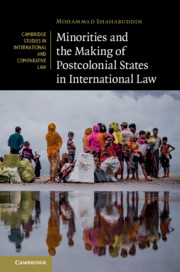
- Cited by 14
-
Cited byCrossref Citations
This Book has been cited by the following publications. This list is generated based on data provided by Crossref.
2021. The Three Ages of International Commercial Arbitration. p. 353.
2021. The League of Nations and the Protection of the Environment. p. 386.
2021. International Investment Law and Legal Theory. p. 358.
2021. State Responsibility and Rebels. p. 231.
2021. Legal Barbarians. p. 180.
2021. The Crime of Aggression under the Rome Statute of the International Criminal Court. p. 458.
2021. Rebellions and Civil Wars. p. 414.
2021. Minorities and the Making of Postcolonial States in International Law. p. 346.
2022. Negative Comparative Law. p. 467.
2022. Reciprocity and Its Practice in Social Research. p. 167.
Sayeed, M A and Aktar, Lima 2023. Between a republican and aBengaleestate: Confronting exclusionary constitutionalism in Bangladesh. Global Constitutionalism, Vol. 12, Issue. 3, p. 562.
Uddin, Nasir 2023. The Border as a Humanized Space: (Un)making Territoriality and Spatiality of State Boundary. Journal of Borderlands Studies, p. 1.
Knotter, Lucas 2024. Contested Statehood in a Contested International Order: Furthering a Research Agenda. Global Studies Quarterly, Vol. 4, Issue. 2,
2024. International Human Rights Law and Practice. p. 476.
- Publisher:
- Cambridge University Press
- Online publication date:
- May 2021
- Print publication year:
- 2021
- Online ISBN:
- 9781108678773




